Alabama, states reliant on fossil fuels sue over new clean air rules

States and industry groups dependent on fossil fuels filed court challenges Friday to President Barack Obama‘s Clean Power Plan, which aims to reduce greenhouse gas emissions. Opponents of the plan filed a flurry of lawsuits at the U.S. Court of Appeals as the Environmental Protection Agency published its final version of the new regulations. The challenges from all but two of the 25 states were filed by Republicans. They deride the plan as an “unlawful power grab by Washington bureaucrats” that will kill coal mining jobs and drive up electricity costs. “The Clean Power Plan is one of the most far-reaching energy regulations in this nation’s history,” said West Virginia Attorney General Patrick Morrisey, among those leading the challenges. “I have a responsibility to protect the lives of millions of working families, the elderly and the poor, from such illegal and unconscionable federal government actions.” The Obama administration and environmental groups counter that the rules are needed to cut carbon emissions while curbing the worst impacts of climate change and sea-level rise. They also say the plan will spur new clean-energy jobs. The new rules require states to cut carbon emissions by 30 percent by 2030. Each state has a customized target and is responsible for drawing up an effective plan to meet its goal. “We are confident we will again prevail against these challenges and will be able to work with states to successfully implement these first-ever national standards to limit carbon pollution, the largest source of carbon emissions in the United States,” said EPA Administrator Gina McCarthy. The EPA says it has authority to enact the plan under the Clean Air Act. At issue are dueling provisions added to the law by the House and Senate in 1990. The EPA’s interpretation relies on the Senate language, but opponents argue that the House version should win out. EPA already regulates other power-plant pollutants under a different section of the Clean Air Act, and the opponents claim the law prohibits “double regulation.” Under the act, certain challenges to agency rules skip the federal district court and go directly to the appeals court in Washington, D.C. Morrisey also filed a stay barring the plan from taking effect while the court challenges proceed, a question that will likely be up to the Supreme Court. “We expect polluters and their allies to throw everything they’ve got at the Clean Power Plan, and we expect them to fail,” said Sierra Club Executive Director Michael Brune, among those defending the law. “The Clean Power Plan is based on a law passed by Congress, upheld by the Supreme Court, and demanded by the American people.” The states challenging the plan in court are Alabama, Arkansas, Arizona, Colorado, Florida, Georgia, Indiana, Kansas, Kentucky, Louisiana, Michigan, Missouri, Montana, Nebraska, New Jersey, North Carolina, Ohio, Oklahoma, South Carolina, South Dakota, Texas, Utah, West Virginia, Wyoming and Wisconsin. Also filing suit against the EPA on Friday was Murray Energy Corp., the nation’s largest privately owned coal company. Members of Congress from coal-mining states joined in, saying they will introduce new legislation aimed at blocking the EPA from enforcing the plan. On the other side, 15 states and the District of Columbia say they are backing the Obama administration and will begin working to comply with the new rules. There is some political variation in the positions taken within the states. In North Carolina, for example, the environmental agency controlled by the Republican governor joined the opposition without the participation of the state’s Democratic attorney general. Governors in Colorado and Michigan said they will work to comply with the new EPA rules, even as attorneys general from their states joined the lawsuit. “Clean air and protecting public health should be everyone’s top priority,” Colorado Gov. John Hickenlooper, a Democrat, said Friday. “We believe that Colorado can achieve the clean air goals set by the EPA, at little or no increased cost to our residents.” Republished with permission of the Associated Press.
Roundup of Mike Hubbard ethics trial coverage from this week
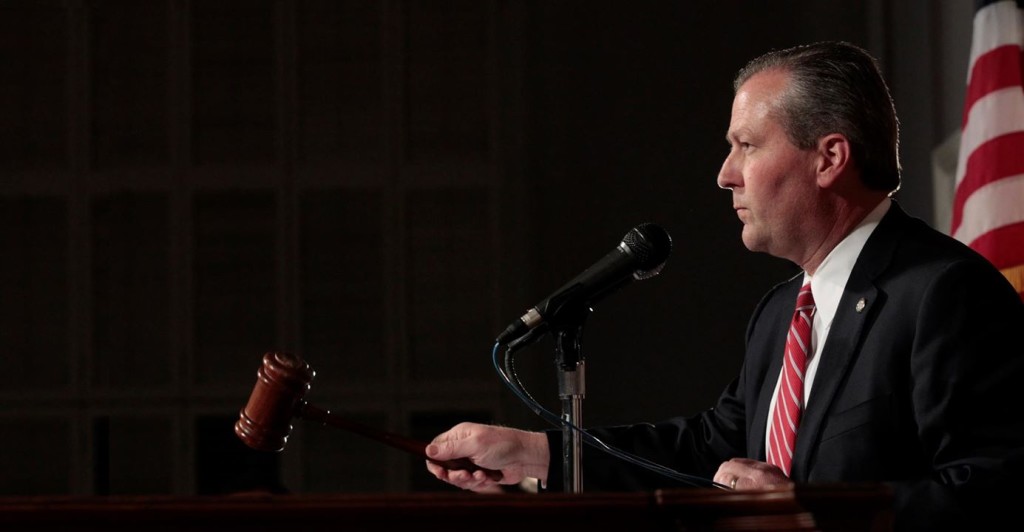
Another week another round of hearings and motions in the long-running ethics trial of Speaker of the House Mike Hubbard, we thought we’d check out coverage and provide you some links in case you missed the latest headlines and editorials. Hubbard’s lawyer has again filed for a continuance in the case – already delayed for a year and a half – this time because his attorney Mark White has had the “unprecedented privilege and honor” of being named dean of the American Academy of Trial Lawyers and is scheduled to speak to the group in Washington. Former deputy attorney general Sonny Reagan also made headlines by appearing at a pretrial hearing to help Hubbard clear his name, arguing Hubbard should not be held accountable because prosecutors had a vendetta against him. Lots going on here, as you can read on AL.com: Speechless: Lawyer wants to delay Hubbard trial again — to give a speech Hubbard prosecutors object to postponement of trial for lawyer to receive award Mike Hubbard hearings wrap up; both sides claim good week Former deputy AG questioned about conversations with Hubbard associates Prosecutor an angry blowhard? The best nuggets from rich corruption hearing Or in the Montgomery Advertiser: Hearing in Mike Hubbard case turns focus on prosecutors Hubbard hearing on prosecutorial misconduct ends Former Deputy AG: Prosecutor wanted to ‘ruin’ Hubbard Hubbard hearing on prosecutorial misconduct ends Or here on Alabama Today via the AP: Judge to hear Mike Hubbard motions to dismiss ethics case Former deputy AG testifies for Mike Hubbard defense Or on Alabama Political Reporter: Hubbard hearing concludes without fireworks Behind Closed Doors in Lee County as Hearing Concludes Statement from Deputy Attorney General Matt Hart Former Ethics Chief: Hubbard Without Ethics Protection No New Evidence Presented at Hubbard Hearing then there was this story on Yellow Hammer News: Former Alabama Deputy AG testifies that prosecutor wants to ‘ruin’ Hubbard politically We’ll continue to cover the trial as it moves forward.
After dismal debate, Jeb Bush seeks ways to steady campaign

Jeb Bush emerged from the third Republican debate as a candidate in crisis, with supporters struggling to understand why he keeps underperforming and advisers promising a turnaround before it’s too late. Campaigning in New Hampshire Thursday, Bush insisted his White House bid was “not on life support.” Still, advisers concede November will be his campaign’s most crucial period to date, a stark contrast to their previous assertions that Bush was best-positioned to outlast rivals in a long campaign. Millions of dollars in TV advertising must start yielding stronger poll numbers, advisers say, and Bush himself must find a way to stop being overshadowed by competitors in the large GOP field. “The intensity is going to increase,” declared Sally Bradshaw, Bush’s senior adviser. To some supporters, that may ring hollow on the heels of Bush’s lackluster performance in Wednesday night’s debate. Aides have spent weeks promising more forceful performances from the bookish former Florida governor, only to see him repeatedly fall flat. The contrast between expectations and reality was particularly striking on the debate stage in Colorado. Bush appeared to land a sharp jab on friend and political mentee Marco Rubio, suggesting the senator should resign if he’s going to keep skipping votes on Capitol Hill while he campaigns for president. But Bush was glaringly ill-prepared for Rubio’s sharp comeback and quickly faded into the background for the rest of the two-hour contest. It was a painful moment for a candidate once seen as the GOP’s best hope for reclaiming the White House. And it deepened concerns about a campaign that less than a week ago was forced to drastically cut its payroll, travel costs and other expenses amid slower-than-expected fundraising. “He was poorly served by whatever campaign adviser told him to go down that path with Marco,” said Brian Ballard, a major fundraiser for both Bush’s campaign and super PAC. “It’s not the kind of ideas campaign that he has promised.” Ballard said he still believes Bush would be the most capable commander in chief of anyone in the race, but he acknowledged he is “really worried” about the campaign trajectory. Bush’s finance team was fielding so many calls from worried donors in the hours after the debate that a special briefing was hastily scheduled Thursday afternoon. After Bush made small talk about his trip to New Hampshire, Bradshaw began by addressing the debate head-on, telling donors, “It was not our best night.” As part of the campaign’s fall revamp, Bush is moving staff out of his Miami headquarters and into early voting states, particularly New Hampshire. The shift ramps up pressure for him in the first-in-the-nation primary, making it essentially a make-or-break state for his campaign. Aides say Bush will spend longer stretches of time there, including a bus tour next week. While he still plans to hold town hall-style meetings, he’ll also add more informal events to his schedule, such as stops at VFW halls for beer and lengthy discussions with veterans. Bush also plans to release a book that chronicles his time as Florida governor through email correspondence with constituents, another move aimed at helping personalize the son of one president and brother of another. Supporters in New Hampshire welcome the promise of more campaign resources in their state, but they aren’t ready to declare the new strategy the answer to the candidate’s problems. “People are sitting on it and watching to see how it evolves,” said Carlos Gonzalez, a New Hampshire state representative and Bush backer. Another key to Bush’s turnaround strategy, according to aides, is getting a return on his team’s early investment in television advertising. Right to Rise USA, the main outside group backing Bush, has spent $14.7 million on ads in New Hampshire, Iowa and South Carolina, and has reserved an additional $30 million in television time through the first week of February. Advisers say the biographical TV spots have improved Bush’s image, especially in New Hampshire, where the campaign’s internal polls show more than half of voters now have a favorable impression of him. At some point, his super PAC is expected to air advertising critical of other Republicans in the race, especially Rubio, who is seen as the top challenger for Bush’s share of the GOP establishment. However, officials with the group would not say when such ads might begin to air. Campaign and super PAC officials insisted on anonymity because they were not authorized to publicly discuss the internal planning. As he travels through New Hampshire and other early states, aides say, Bush will argue that his record in Florida, including cutting taxes, balancing the budget and managing the state through eight hurricanes, best prepares him for the demanding job of president. In a campaign season where voters are voicing frustration with Washington, he’ll be cast as a problem solver who can get the nation’s capital on track. As part of that message, Bush’s campaign tested a new slogan at the event in New Hampshire Thursday: “Jeb Can Fix It.” Anxious Bush supporters can only hope that’s the case. Republished with permission of the Associated Press.
Day after debate, Marco Rubio looks beyond primary toward Hillary Clinton
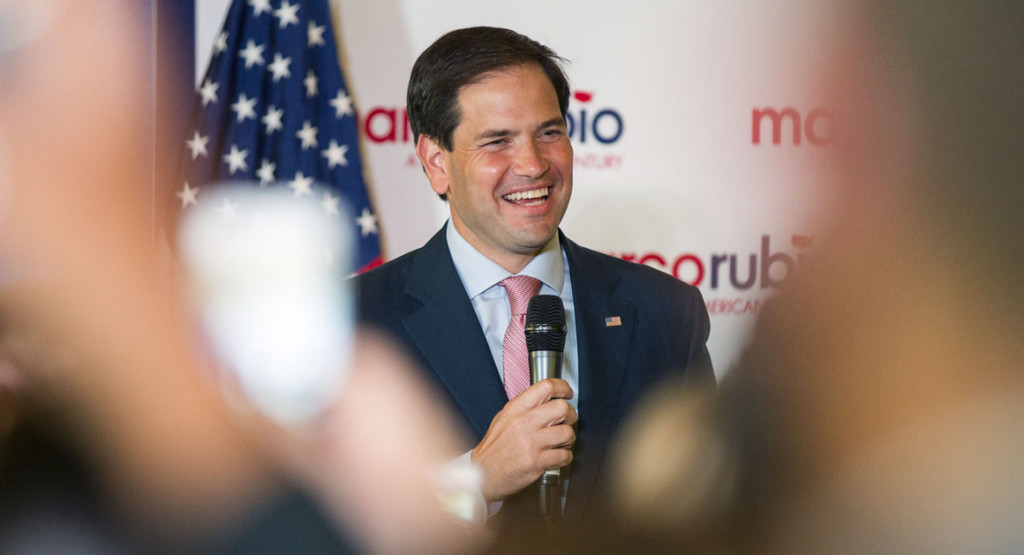
Marco Rubio tried to build on his well-reviewed performance in the GOP debate by lashing out at Hillary Rodham Clinton on Thursday, turning toward the general election with a focus on the deadly 2012 attacks in Benghazi, Libya. Given the chance to follow-up on the clash between still-large field of candidates for the Republican presidential nomination, and most notably a memorable exchange with former Florida Gov. Jeb Bush, Rubio said in a series of interviews he’d rather talk about Clinton. Beginning where he left off in Wednesday night’s debate, the Florida senator accused the former secretary of state of not telling the truth about what happened in the Sept. 2012 attacks, which led to the deaths of four Americans, including U.S. Ambassador Chris Stevens. Rubio said Clinton was trying then to keep the attack from damaging President Barack Obama‘s re-election campaign. “The narrative of their campaign at the time was that al-Qaida was on the run and had been defeated. And this countered that narrative. They didn’t want that out there,” Rubio said on CBS “This Morning,” one of six interviews he did Thursday. The focus on Clinton was notable, as it came hours after Rubio’s campaign was touting how he deflected an attack from Bush in the debate over his attendance record in the Senate. The campaign said it had raised more than $750,000 online from 14,000 donors by 3 p.m. Thursday. But rather than pile on, Rubio said Thursday on ABC’s “Good Morning America” that he has “admiration” for Bush and wants only to underscore policy differences between the two. Instead, he spent his time keeping after Clinton in what amounts to a general election argument against the front-runner for the Democratic nomination. “Every successful presidential candidate carries out a message that resonates with voters in the primary and general elections,” said Josh Holmes, a former adviser to Senate Majority Leader Mitch McConnell. “Rubio has the most identifiable strategy to do that.” “It’s a very productive primary strategy and it preserves your option in the general election when you ultimately prosecute the case against Hillary Clinton,” said Holmes, founder of Washington-based Cavalry LLC and not affiliated with any presidential campaign. During the GOP presidential campaign, Rubio has kept a steady drumbeat of criticism directed Clinton — including in Wednesday night’s debate. Having been mentioned in an answer to a question about another topic, Rubio seized on the chance to take the floor and talk about Clinton’s 11 hours of testimony last week before a congressional committee investigating the Benghazi attacks. “The mainstream media is going around saying it was the greatest week in Hillary Clinton’s campaign,” Rubio said. “It was the week she got exposed as a liar.” Republicans have cited Clinton’s public statement after the 2012 incident that said some people believed the attack came in response to an anti-Muslim video. At the hearing, they produced copies of emails Clinton wrote her family saying it was a terrorist attack by an al-Qaida-like group. Clinton defended her actions, saying there was much conflicting intelligence in the fast-moving aftermath of the attacks. In the days after the Benghazi attack and before the election, Obama on multiple occasions described the events as acts of terror. In recent weeks, Rep. Trey Gowdy, R-S.C., the committee chairman, was forced to defend the panel as some members of his own party suggested Clinton is the panel’s target. House Majority Leader Kevin McCarthy, R-Calif., said last month that the committee can take credit for Clinton’s diminished public standing in recent months, a comment he later retracted. Campaigning in New Hampshire on Thursday, Clinton said she didn’t make much of the GOP debate. “You would have bene better off watching the World Series,” Clinton said during a campaign stop in Berlin, New Hampshire. “The debate in my view was a swing and a miss.” Republished with permission of the Associated Press.
Ben Carson: Seventh-day Adventism is right for him
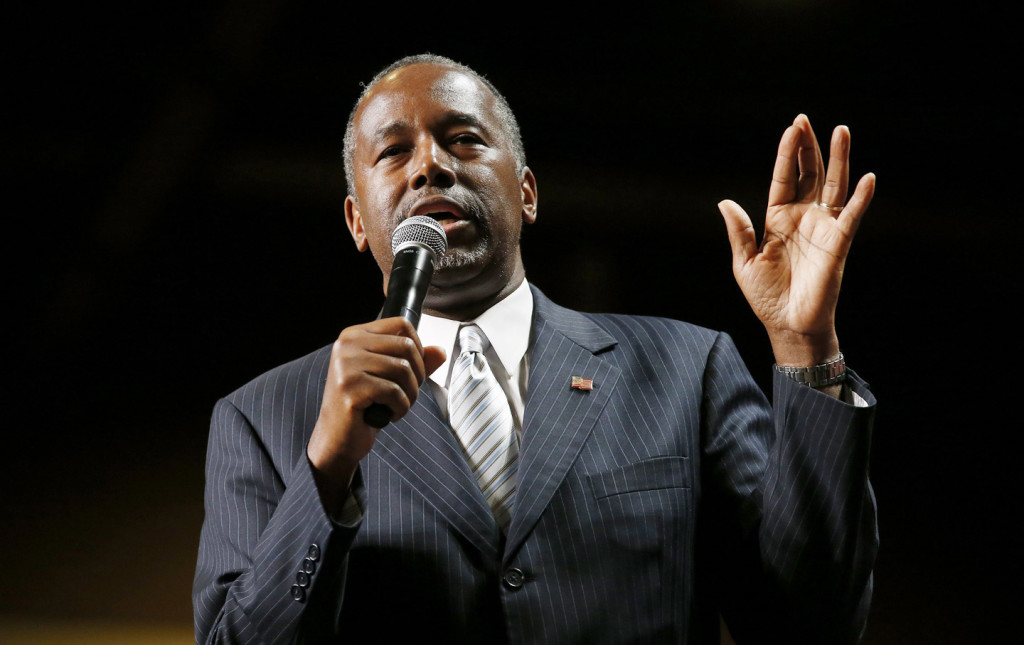
As his surge in heavily evangelical Iowa puts a spotlight on his faith, Republican presidential candidate Ben Carson is opening up about his membership in the Seventh-day Adventist Church. He embraces it as right for him while also framing his beliefs in broad terms that aim to transcend divisions among Christians. In an interview with The Associated Press, days after GOP rival Donald Trump criticized Carson’s church, the retired neurosurgeon said his relationship with God was “the most important aspect. It’s not really denomination specific.” Carson discussed a brief period as a college student when he questioned whether to stay in the church. And in his own criticism, he said it was a “huge mistake” that the top Adventist policymaking body recently voted against ordaining women. “I don’t see any reason why women can’t be ordained,” he said. The remarks from the Republican presidential candidate were his most expansive about his church since he joined the 2016 contest. Voters have come to know him for his faith-infused policy stands, including his opposition to abortion and gay marriage, without hearing much from him about his Adventism. The church, formed in 1863 in Battle Creek, Michigan, has a spiritual focus on healthy living and an extensive network of hospitals and medical clinics. Carson expressed pride in the denomination, while also trying to reach beyond it. “There are a lot of people who have a close relationship with God, and you can generally tell who they are by the way they act, the way they treat other people,” he said Wednesday a few hours before the GOP debate. “The reason that there are like 4,000 denominations is that people have looked at this and said, ‘Let’s interpret it this way. Let’s interpret it this way.’ “Sometimes they get caught up in that and forget about the real purpose of Christian faith,” he said. Trump has appeared to be trying to paint Carson as part of a faith outside the mainstream, not a religious conservative who shares the values of Iowa’s evangelicals. During a rally last Saturday in Florida, Trump noted he was a Presbyterian, calling his own church “middle of the road.” Then he added, “I mean, Seventh-day Adventist, I don’t know about.” A possible impetus for Trump’s new approach was a series of preference polls showing Carson overtaking him in Iowa, the lead-off caucus state where evangelical voters are crucial to success for Republicans. In 2012, Mitt Romney, a Mormon, won just 14 percent of Iowans who described themselves as born again or evangelical Christian, according to Iowa caucus exit polls, amid deep skepticism about his church and his politics. Carson told the AP he had “totally anticipated” that Trump and his supporters would try to stir doubts about his church in the primary contests. “Donald Trump is Donald Trump. It doesn’t surprise me that he’s doing that. I would only be surprised if he didn’t,” Carson said. “There’s a lot of things that are done in politics that are not fair, but when you get into the fray you have to expect those things.” The Seventh-day Adventist Church was born from what is known as the “Great Disappointment,” when Jesus failed to arrive in 1844 as expected by thousands of Christians in a moment of widespread religious fervor known as the Second Great Awakening. Many of these disheartened faithful, called Adventists for their belief in Christ’s imminent return, continued studying the Bible together and set Saturday as their Sabbath day of worship. Ellen White and her husband James were leaders in that movement and founded the Seventh-day Adventist Church. The denomination says it now has 18.7 million members worldwide, with 1.2 million in North America. For the small number of evangelicals who pay close attention to the church, their unease is focused in part on Ellen White, a prolific writer considered a prophet by Adventists, whose views continue to shape the denomination. Some pastors in the Southern Baptist Convention protested this year when Carson was invited to address their annual meeting. While the reasons for the objections were mixed, some cited the religious weight given to White’s opinions, even though Adventists, like other conservative Christians, consider only the Bible authoritative. “We caught wind of the controversy and just gracefully bowed out,” Carson said, shrugging off the episode. Carson is accustomed to misunderstandings about his church. “A lot of people would ascribe any weird thing they heard about anybody — they’d say, ‘That’s the Adventists,’” he said. His mother was an Adventist, and he was baptized into the church twice at his own request, because he felt he was too young the first time to grasp the significance. He has served as an elder, a religious teacher and as a star representative of the denomination around the world. Videos are plentiful online of Carson debating atheists, upholding Adventist teaching that God created the Earth in six days, and giving personal testimonies at churches. A twice-daily Bible reader, Carson said he still belongs to his longtime church in Spencerville, Maryland, and to another in Florida. If he’s on the road campaigning on a Saturday, he and his wife will try to find a local Adventist church or watch services online. In the interview, Carson revealed he went through a brief period of questioning as a Yale University student about whether Adventism was right for him. He said he was upset by segregation in the church. After trying out services at Roman Catholic, Methodist, Baptist and Lutheran churches, he ended up staying. “I concluded it was the right church, just the wrong people. The church was very segregated. You know, if you have the love of God in your heart, it seems like you wouldn’t do that. That has changed fairly significantly since that time,” Carson said. Traces of the anti-Catholic prejudice White expressed in her writings can still be found in Adventism. Carson rejects that bias. “I love Catholics. My best friend is Catholic. I have several honorary degrees from Catholic universities,”
Alabama lawmakers welcome Paul Ryan as House speaker
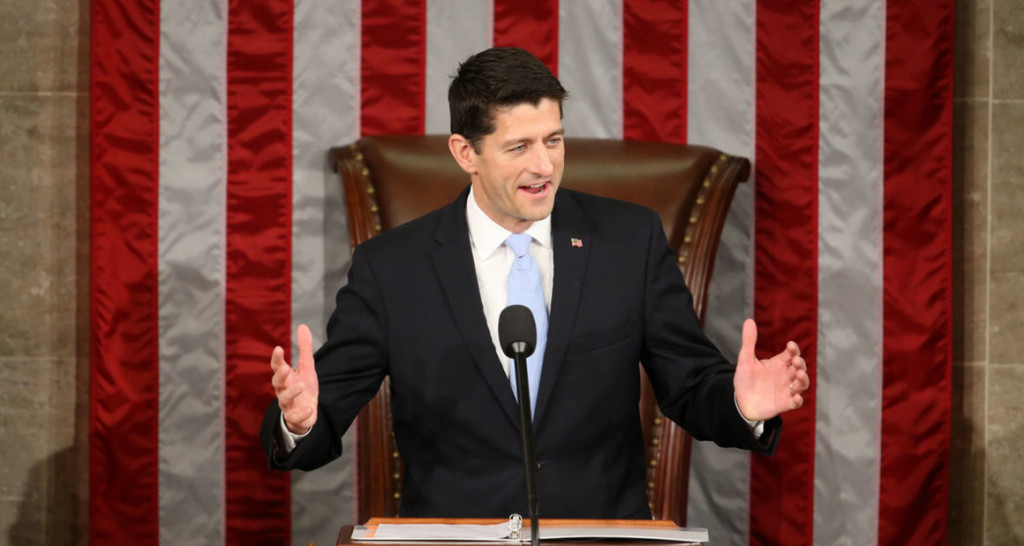
Alabama lawmakers welcomed the newly elected Speaker of the U.S. House of Representatives, Republican Rep. Paul Ryan (R-Wis.) as he took over the post from outgoing speaker Rep. John Boehner (R-OH) Thursday morning. Ryan won his Party’s nomination Wednesday afternoon before being elected speaker by the full House chamber Thursday morning. Here’s what the Alabama delegation has to say about speaker Ryan: U.S. Rep. Bradley Byrne (AL-01): Paul Ryan is a leading conservative thought leader who can unite the Republican Party and allow us to focus on advancing conservative solutions. With today’s leadership change, it is my hope the House will return to regular order and allow all Members to have a role in the legislative process. Pleased to hear @SpeakerRyan commit to regular order and a focus on empowering all Members of Congress. That’s how the House should operate. — Rep. Bradley Byrne (@RepByrne) October 29, 2015 U.S. Rep. Martha Roby (AL-02): I’m pleased House Republicans have come together to support Paul Ryan for Speaker. I’m a conservative, so I want a bold leader who can unite Republicans and advance a conservative agenda. Paul Ryan is uniquely qualified to do that, so he has my support, and I hope he will be able to lay out a path to success despite a tough political environment. New leadership is a good thing sometimes, but it doesn’t mean everyone is going to start agreeing on every issue, every time. What’s important is to have a Speaker who will listen, be fair to all the Members, and follow through with commitments. No matter who is Speaker, my job is to look out for the interests of those I represent and to fight on their behalf in Washington. Well said, @SpeakerRyan. Congratulations! https://t.co/46yZH75Gs2 — Rep. Martha Roby (@RepMarthaRoby) October 29, 2015 U.S. Rep. Mike Rogers (AL-03): I believe that Paul Ryan is the right leader to become Speaker of the House. I thank him for putting the future of our country ahead of his own ambitions, and believe now is the time for conservatives in Congress to unite together in opposition to President Obama’s reckless policies like Obamacare and Planned Parenthood. Prior to the nomination by House Republicans, U.S. Rep. Mo Brooks (AL-05) sent Ryan a letter asking him to agree to terms on immigration before it cast his vote. Upon Ryan’s agreement, Brooks said: Based on Paul Ryan’s representations and my trust that Paul Ryan is a man of his word, I will vote for Paul Ryan for House Speaker on the House Floor if he is the Republican nominee. U.S. Rep. Gary Palmer (AL-06): Speaker Ryan has been granted the opportunity by a majority of his colleagues to lead the House. I believe he is capable. This has never been about the person or personality, but about process, about restoring regular order and having the House function as the Founders designed it to and as it should. We can restore constitutional governance, representative government, which is what we have all been elected to do. After hearing Speaker Ryan’s speech, I believe we have taken a major step forward. I look forward to working with Speaker Ryan and all of my colleagues as we pursue this goal.
Matt Corrigan on Jeb Bush: “I think he’ll fight to the end”
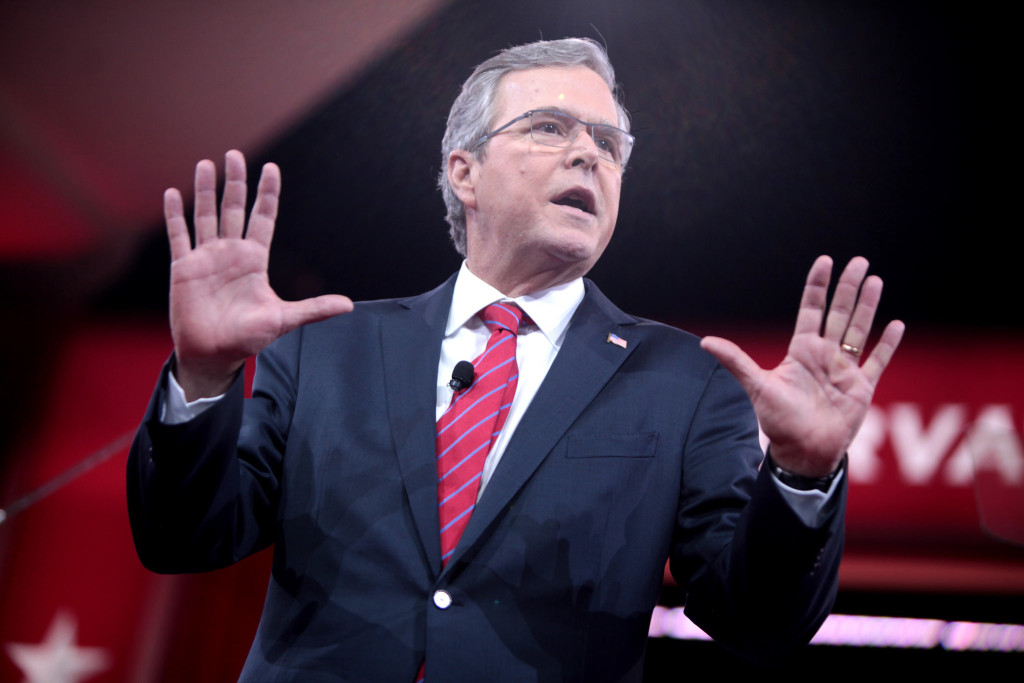
Reports of Jeb Bush’s demise are premature, says the man who wrote the book on his tenure as Florida governor. “As someone who has written about him, what I will say is, he is not a quitter. He is a fierce competitor. I think he’ll fight to the end,” author and University of North Florida professor Matt Corrigan said Thursday. Corrigan’s “Conservative Hurricane“ is a well-regarded look at Bush’s time in Tallahassee. He concedes that after Wednesday night’s CNBC debate, it’s not looking good for the candidate once seen as the easy establishment favorite. “He’s in a very difficult spot now. Because most of the media’s written him off. Once you get to that place it’s tough to raise funds. “Here are the questions for him going forward. One, can he raise the hard money, not the Super PAC money, but money to keep going through Iowa and New Hampshire? “And two, what is his theory of the rest of the campaign? If Rubio is emerging as the so-called establishment choice, why is Bush any better than that choice? That’s what he needs to determine.” Corrigan remains far from convinced that Donald Trump or Ben Carson will become the GOP standard-bearer in 2016. “Frankly, the only bright spot for Jeb is the others in the field. Whether Trump or Carson hold up is a big question. And if they don’t make it, the question is who can? You’re really down to [Ted] Cruz, [Marco] Rubio and Bush. So I think it’s premature to stay he’s done. There’s still no consensus party choice. Why not stay in it? Yes, he’s in a terrible spot, but I don’t think he’s going to go away. He’s just not a quitter. He’ll fight until there’s no chance. And with the current lineup and so many uncertainties out there, he can’t say there’s no chance. “I’m going against conventional wisdom to say he’ll be around for a while.”
History shows Marco Rubio resignation would be rare event
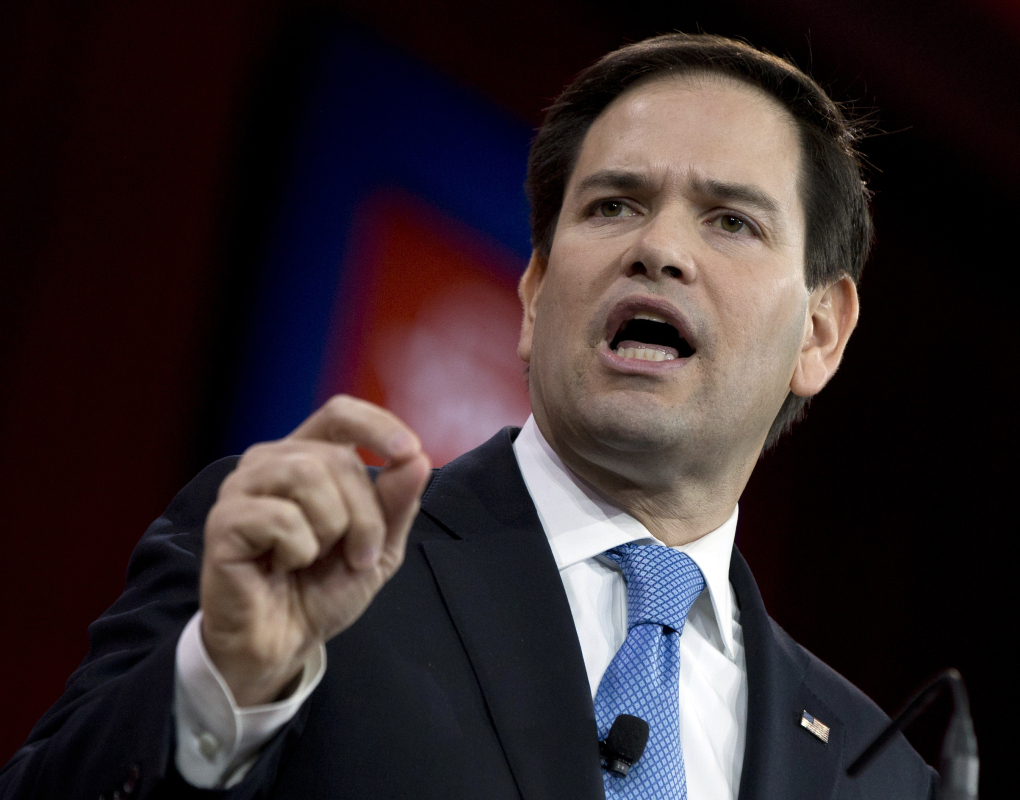
The South Florida Sun-Sentinel’s editorial on Wednesday that called on Marco Rubio to resign “and not rip us off” ignited a number of others to follow suit. It came as Rubio has continued to miss votes in the upper chamber of Congress while on the campaign trail and unapologetic about it. Instead, he’s indicated he doesn’t even really like the job. Historical precedent, though, indicates that if Rubio quit, it would be the exception to usual presidential politics. On his Smart Politics blog, Eric J. Ostermeier of the University of Minnesota writes that since 1972 there have been a total of 50 presidential candidacies by 45 sitting U.S. senators. Only one of these resigned before the presidential election: Bob Dole of Kansas in 1996. Dole only did so, in June 1996, after he had already secured the GOP nomination, and after the last batch of presidential primaries. During the past 40 plus years no other sitting U.S. senator running for the White House cut short their day job before the presidential election. Like Rubio, several of those senators were running for president in cycles in which their term in the nation’s upper legislative chamber was coming to an end – 12 in all: Four opted not to run for re-election: Democrat Fred Harris of Oklahoma (1972), North Carolina Democrat John Edwards (2004), Florida Democrat Bob Graham (2004), and Florida Republican Marco Rubio (2016) Seven failed in their presidential bids but still won re-election to their U.S. Senate seats that cycle: West Virginia Democrat Robert Byrd (1976), Texas Democrat Lloyd Bentsen (1976), Washington Democrat Scoop Jackson (1976), Kansas Republican Bob Dole (1980), Texas Republican Phil Gramm (1996), Utah Republican Orrin Hatch (2000), and Delaware Democrat Joe Biden (2008) One is currently running for both offices: Kentucky Republican Rand Paul (2016) And one stat where Rubio would definitely like to emulate Barack Obama: Of those 50 senators who have run for president since 1972, only one – Obama – actually became president. Much has been made of Rubio’s voting record. He’s missed about 34 percent of his from from the start of the year through last week. However, as reported by PolitiFact, from 2007 to 2008, Obama missed more than 64 percent of votes. From 2003 to 2004, John Kerry missed 72 percent of votes, and former Florida Sen. Graham missed about 37 percent of his votes when he ran in 2003-2004. Ironically, the man that Rubio succeeded in the Senate, Mel Martinez, did leave his seat more than a year before his term was set to expire.
Angi Stalnaker: Why Homewood’s smokefree movement is getting it wrong

The Homewood City Council passed one of the most aggressive smoking ordinances in the state several years ago and that ordinance has served as a model for similar ordinances throughout the state. Recently, a group of concerned citizens calling themselves “Smokefree Homewood” started a movement to expand the smoking ordinance and include provisions to ban the use of vape products inside privately owned vape businesses with an ordinance that would continue to make it permissible to smoke cigarettes and cigars inside tobacco shops. (You didn’t read that wrong. The ordinance would allow smoking in tobacco shops but would ban vape use in vape shops.) A public hearing held by the Homewood City Council this week gave residents the opportunity to voice their support for or opposition of the ordinance expansion and the “Smokefree Homewood” movement brought nearly 20 people to speak on their behalf while the vape industry presented four speakers on its behalf. The hearing, which lasted more than an hour, turned out to be the perfect example of how the smokefree movements in Homewood and across the country are getting in wrong when it comes to the vape industry. The fact is that the vape industry and the smokefree movement have the same goal. They both want to encourage people to make healthier choices and to end their dependence on dangerous tobacco products. Research from well-respected medical facilities shows that former smokers who use vape products to try to quit smoking are much more likely to give up their tobacco habit permanently than those who try a variety of other methods. The studies also show that vape usage has no secondhand effect on the air quality surrounding the user and that such products are 95 percent safer than smoking cigarettes. Even UAB recently acknowledged that vape use should not be condemned when the UAB employee benefits committee issued a statement amending its nicotine usage policy. The committee removed the use of e-cigarettes or “vaping” as a declared tobacco product and will no longer charge an additional wellness fee to users of electronic cigarettes and vape products. So, overwhelming medical research shows that vaping is a safer alternative to smoking and even UAB has made in a change in its policy to reflect that. Furthermore, Alabama law prohibits the sale of the products to anyone under 19 years old so there is no marketing or sales to children. Even the American Heart Association acknowledged in their journal, Circulation, that electronic cigarette usage is one of the most effective tobacco cessation techniques available. But, when faced with all of the research and evidence, the smokefree movement decided to attack the vape industry instead of joining them to pursue a common goal. For nearly an hour, person after person went to the microphone, many of them quoting studies that espouse the harm of electronic cigarettes. They told horror stories about the vape industry. The irony is that they were not quoting independent studies: They instead referred to research funded and distributed by the tobacco industry. How is that for irony? The smokefree movement discounted independent medical studies and instead chose to carry the propaganda of Big Tobacco. I don’t think it was intentional. I don’t think many of the smokefree advocates knew that the studies they quoted were so flawed. I believe they genuinely were trying to do the right thing for their community and their families. Unfortunately, they were playing right into the hands of Big Tobacco. This is not isolated to Homewood. This happens across Alabama and throughout this country. The smokefree movement would be best served by following the advice of fellow smokefree advocate, Scott Ballin. Ballin is a former American Heart Association VP and a former coordinator for Tobacco Free Kids and he advocates for a coordinated public education effort about the potential role that electronic cigarettes could play in reducing disease and death caused by tobacco usage. The smokefree movement is waging a war but they are aiming their artillery in the wrong direction and that’s not good for anyone. Angi Stalnaker is an Alabama native who, as a political consultant, has worked on numerous statewide, legislative and constitutional amendment races for conservative causes and candidates. For more information about her visit Virtus Solutions.
Paul Ryan elected 62nd House speaker
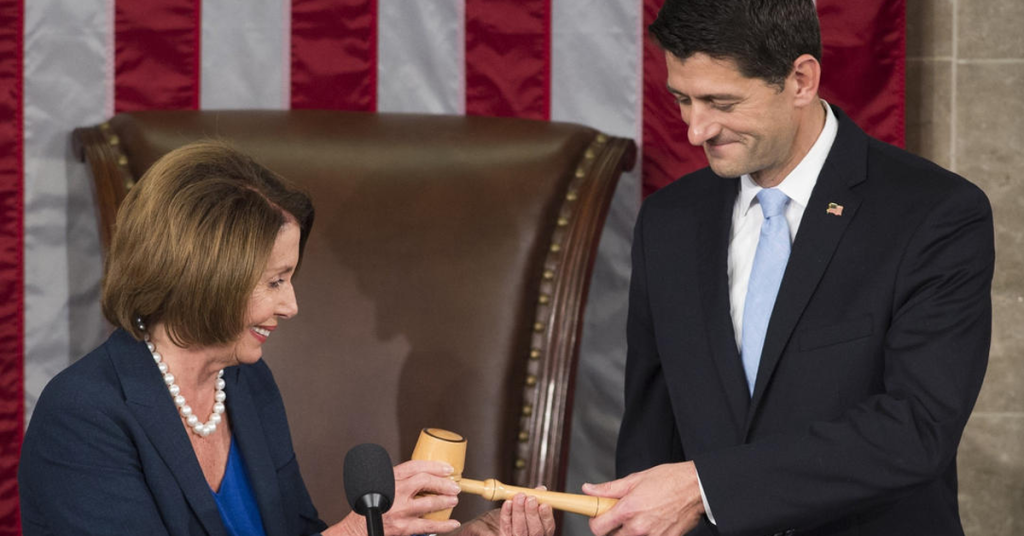
It’s a big day for Rep. Paul Ryan. The U.S. House of Representatives welcomes the Wisconsin Republican as the 62nd speaker of the House. Largely a formality – after House Republicans nominated him for the position on Wednesday afternoon – Ryan won the support of 236 House members during Thursday morning’s vote. After cinching the position, Ryan arrived on the House floor to a sea of applause. There both Republicans and Democrats joined in congratulating him on his position before House Minority Leader Nancy Pelosi, a California Democrat, passed the gavel his way. “It’s not till you hold this gavel and stand in this spot and look out and see all 435 members of the House – as if all of America was sitting right in front of you,” Ryan began his first speech as House Speaker. “It’s not till then that you feel it: the weight of responsibility, the gravity of the moment.” Ryan continued, “I never thought I’d be the Speaker. But early in my life, I wanted to serve in the House. I thought the place was exhilarating – because here, you could make a difference. If you had a good idea and worked hard, you could make it happen. You could improve people’s lives. To me, the House represented the best of America: the boundless opportunity to do good.” The GOP’s vice-presidential nominee in 2012 and the current chairman of the House Ways and Means Committee, the new House Speaker began his Capitol Hill career as a legislative aide in 1992 and won his Wisconsin House seat in 1998, at 28. At just 45 years old, the reluctant leader is the youngest speaker since 1869.
At 3rd GOP debate Jeb Bush’s comeback strategy backfires
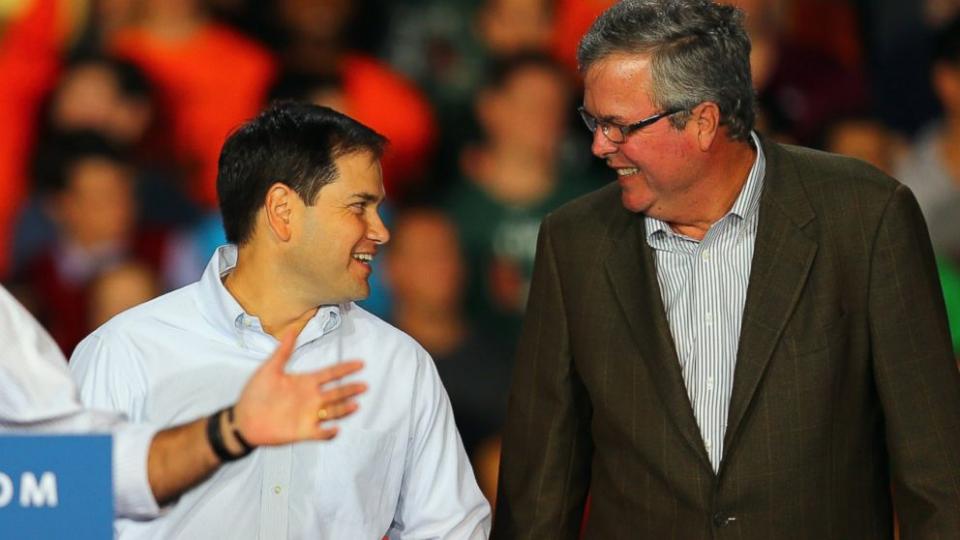
Jeb Bush sought to calm anxious donors with a comeback strategy focused on taking down rival Marco Rubio. But Bush’s plan backfired badly on national television in the third GOP presidential debate. Instead of generating much needed momentum, Bush’s attack on his onetime protege raised new questions about his underwhelming candidacy in the primary contest he was once expected to dominate. And Bush’s continued struggles highlight a deepening sense of uncertainty settling over a 2016 Republican presidential race that remains crowded and without a clear front-runner. Even with an estimated $100 million in the bank, Bush headed into Wednesday’s prime-time debate at the weakest point of his campaign. Just five days earlier, the son and brother of former presidents announced deep campaign spending cuts designed to salvage his floundering bid. He slashed salaries by 40 percent and shifted staff from his Miami headquarters to early voting states. With his powerful family on hand, Bush spent much of the weekend huddling behind closed doors outlining a strategy that depended, above all else, on challenging Rubio. Bush appeared to get the perfect opportunity to test his strategy when he was positioned right next to Rubio on the debate stage. The mild-mannered Bush mustered up an attack on Rubio for missing so many votes in the Senate. “Marco, when you signed up for this, this was a six-year term, and you should be showing up to work. I mean, literally, the Senate – what is it, like a French work week? You get, like, three days where you have to show up? You can campaign, or just resign and let someone else take the job.” It was the moment Bush’s supporters had been waiting for. But so, apparently, was Rubio. The first-term senator, Bush’s junior by 18 years, quickly charged that Bush had praised Arizona Sen. John McCain, who has missed many votes as well. “I don’t remember you ever complaining about John McCain’s vote record,” Rubio said. “The only reason why you’re doing it now is because we’re running for the same position, and someone has convinced you that attacking me is going to help you.” The fresh-faced senator then pivoted beautifully: “My campaign is going to be about the future of America, it’s not going to be about attacking anyone else on this stage.” The crowd cheered. Bush’s team did not. Ari Fleischer, who worked in the George W. Bush administration, said Bush should have attacked Donald Trump instead of Rubio. “Mistake going after Rubio,” Fleischer tweeted. Bush never seemed to recover from the exchange, which took place just minutes into the debate. He almost completely disappeared for long stretches. In fact, Bush had the least speaking time of anyone in the debate, by some counts. Despite his challenges, there is no sign that Bush is close to abandoning his campaign. An allied super PAC has raised more than $100 million on his behalf. Yet if Bush World was worried heading into the debate, they felt no better Thursday morning. Rubio, who has been showing signs of momentum recently, shone for most of the night. He continues to face questions about his ability to build a national organization and raise the money necessary to support it, a problem Bush does not have. Yet his fundraising should improve coming off a strong performance on national television. “This is all part of slowly moving up in the process,” Rubio’s campaign manager, Terry Sullivan, said after the debate. Asked about Bush’s performance, Sullivan said, “There’s no need to pile on Gov. Bush.” The other candidates had varied performances. The soft-spoken retired neurosurgeon Ben Carson, who has led recent polls, flashed his personality at times, but struggled to articulate his policies at others. Trump was on the attack early and often, but also was silent for long stretches. And Texas Sen. Ted Cruz earned top marks from the audience and on social media for attacking the media and defending single mothers. Yet nearly three months before the Iowa caucuses, the race for the 2016 Republican presidential nomination is as unsettled as ever. Bush’s team conceded that Rubio had a strong night. “No one is going to argue Sen. Rubio is an outstanding performer,” Bush campaign manager Danny Diaz said. “But there’s a difference between an outstanding performer and someone who has delivered over and over again.” He said Jeb was able to talk about issues, and if he keeps doing that he will win over voters. Meanwhile, Bush retreats to New Hampshire on Thursday for a two-day campaign swing in a state that increasingly looks like a must-win. Bush’s team circulated talking points shortly before the debate noting he has more paid staff in New Hampshire than any of the four states set to hold primary contests in February. And further increasing expectations, the talking points note that “we are placing a special focus on increasing our New Hampshire operation.” Rubio is scheduled to visit New Hampshire next week. Republished with permission of The Associated Press.


